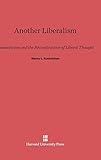Another Liberalism : Romanticism and the Reconstruction of Liberal Thought / Nancy L. Rosenblum.
Material type: TextPublisher: Cambridge, MA : Harvard University Press, [2013]Copyright date: ©1987Edition: Reprint 2014Description: 1 online resource (225 p.)Content type:
TextPublisher: Cambridge, MA : Harvard University Press, [2013]Copyright date: ©1987Edition: Reprint 2014Description: 1 online resource (225 p.)Content type: - 9780674864412
- 9780674864429
- 320.5/1
- JC571
- online - DeGruyter
| Item type | Current library | Call number | URL | Status | Notes | Barcode | |
|---|---|---|---|---|---|---|---|
 eBook
eBook
|
Biblioteca "Angelicum" Pont. Univ. S.Tommaso d'Aquino Nuvola online | online - DeGruyter (Browse shelf(Opens below)) | Online access | Not for loan (Accesso limitato) | Accesso per gli utenti autorizzati / Access for authorized users | (dgr)9780674864429 |
Frontmatter -- Contents -- Acknowledgments -- CHAPTER 1. Romantic Militarism versus Civil Society -- CHAPTER 2. The Law of the Heart versus Liberal Legalism -- CHAPTER 3. The Penumbra of Privacy -- CHAPTER 4. Beyond Liberalism and Romanticism: Antipolitics and the Spirit of Detachment -- CHAPTER 5. Heroic Individualism and the Spectacle of Diversity -- CHAPTER 6. The New Face of Pluralism: Self-Cultivation and Shifting Involvements -- CHAPTER 7. Repairing the Communitarian Failings of Liberal Thought -- CONCLUSION -- Notes -- Index -- INTRODUCTION
restricted access online access with authorization star
http://purl.org/coar/access_right/c_16ec
Another Liberalism contributes an original perspective to debates about the nature and foundations of liberal thought. In it Nancy Rosenblum describes the dynamic of romanticism and liberalism as one of mutual opposition and reconciliation. She argues that romanticism sees liberalism as cold, contractual, and aloof. And conventional liberal legalism disdains romanticism's longing for all that is personal, unique, and expressive. We learn, however, that romanticism, chastened by its excesses and frustrated by its failures, can "come home" to liberalism. We also learn that liberalism can accommodate individuality and expressivity, reclaiming what it had repressed. Rosenblum creates a typology of romantic reconstructions of liberal thought: heroic individualism, communitarianism, and a new face of pluralism. The author draws on nineteenth--and twentieth--century philosophy and literature: on Thoreau, Humboldt, Constant, Stendhal, and Mill, among others, and on contemporary political theorists for whom romanticism is a source not only of aversion to liberalism but also of resources for reform.
Mode of access: Internet via World Wide Web.
In English.
Description based on online resource; title from PDF title page (publisher's Web site, viewed 29. Nov 2021)


